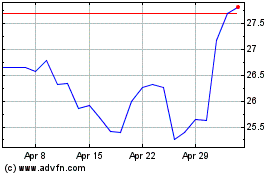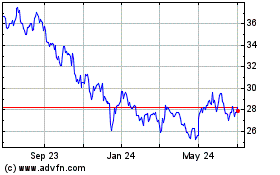Data on First Smoothened Inhibitor to Show
Clinical Benefit in This Patient Population to be Presented During
Oral Session at 2016 ASH Annual Meeting
Today, Pfizer Inc. (NYSE:PFE) announced new
data from a randomized Phase 2 study of glasdegib (PF-04449913), an
oral, smoothened (SMO) inhibitor, showing the addition of glasdegib
to low-dose cytarabine (LDAC) significantly increased overall
survival (OS) when compared to LDAC alone in patients with acute
myeloid leukemia (AML) or high-risk myelodysplastic syndrome (MDS)
who were ineligible for intensive chemotherapy (HR: 0.501, 80% CI:
0.384, 0.654, one-sided log rank p-value 0.0003). Glasdegib is the
first SMO inhibitor to show clinical benefit in this patient
population. These data were presented today at the 58th American
Society of Hematology (ASH) Annual Meeting and Exposition in San
Diego, CA.
Glasdegib is an investigational oral therapy that inhibits the
SMO receptor, thereby disrupting the hedgehog (Hh) pathway. The
results presented are from a Phase 2, multicenter, randomized study
that included 132 patients with previously untreated AML or
high-risk MDS who were ineligible for intensive chemotherapy.
Patients were treated with either LDAC 20mg subcutaneously twice
daily for ten days plus oral glasdegib 100 mg daily or LDAC alone.
The primary endpoint of this study was OS.
“The hedgehog pathway is a compelling target in cancer research
because of the ability to target and disrupt the root of the
cancer, that is the cancer-originating cell,” said Jorge Cortes,
University of Texas, MD Anderson Cancer Center. “As the first
smoothened inhibitor to demonstrate clinical benefit in patients
with AML and high-risk MDS who were ineligible for intensive
chemotherapy, these results with glasdegib provide hope that
interfering with this pathway may lead to potential new treatment
options for blood cancers that may improve patient outcomes.”
The results presented show that at the time of data cut-off,
median OS for patients taking glasdegib plus LDAC (n=88) was 8.8
months (80% CI: 6.9, 9.9) compared to 4.9 months (80% CI: 3.5, 6.0)
for patients taking LDAC only (n=44) (HR: 0.501, 80% CI: 0.384,
0.654, one-sided log rank p-value 0.0003). Low blood counts and
gastrointestinal toxicities occurred more frequently among patients
treated with glasdegib plus LDAC than those treated with LDAC
alone. Blood infections were less among patients treated with
glasdegib plus LDAC (3.6 %) compared to LDAC alone (12.2%).
Patients in the glasdegib plus LDAC group experienced increased
distortion of taste (23.8%), muscle spasms (20.2%) and thinning or
loss of hair (10.2%). Serious AEs of febrile neutropenia were also
more frequent in patients taking glasdegib plus LDAC (36.9%)
compared to LDAC alone (26.8%). The most common cause of death in
both arms was disease progression.
“Acute myeloid leukemia is a rapidly progressing blood cancer
for which new treatment options are needed,” said Mace Rothenberg,
MD, chief development officer, Oncology, Pfizer Global Product
Development. “Pfizer is excited about the promising data seen in
AML patients treated with glasdegib and is working to explore
further opportunities to evaluate glasdegib in the treatment of
this disease.”
For more information about glasdegib and other hematology
products in development by Pfizer, please visit
http://www.pfizer.com/pfizer_oncology_press_kit.
About Glasdegib
Glasdegib is an investigational oral therapy that inhibits the
SMO receptor, thereby disrupting the hedgehog (Hh) pathway. SMO
inhibition of Hh signaling impacts tumor biology by disrupting the
regulation of cancer stem cell (CSC) survival. This may inhibit
development of drug resistance and prevent relapse. Glasdegib is
currently under investigation for select hematologic malignancies,
including AML and MDS.
About Pfizer Hematology
Along with our marketed products for hematological conditions,
Pfizer is advancing a broad range of therapies that leverage select
pathways and mechanisms of action to address acute and chronic
leukemias, myeloproliferative disorders and lymphoma. In the
near-term, Pfizer is in discussions with global regulatory
authorities about inotuzumab ozogamicin for the treatment of acute
lymphoblastic leukemia (ALL) and Mylotarg (gemtuzumab ozogamicin)
for the treatment of acute myeloid leukemia (AML).
About Pfizer Oncology
Pfizer Oncology is committed to pursuing innovative treatments
that have a meaningful impact on those living with cancer. As a
leader in oncology speeding cures and accessible breakthrough
medicines to patients, Pfizer Oncology is helping to redefine life
with cancer. Our strong pipeline of biologics, small molecules and
immunotherapies is one of the most robust in the industry, and is
studied with precise focus on identifying and translating the best
scientific breakthroughs into clinical application for patients
across a wide range of cancers. By working collaboratively with
academic institutions, individual researchers, cooperative research
groups, governments and licensing partners, Pfizer Oncology strives
to cure or control cancer with its breakthrough medicines. Because
Pfizer Oncology knows that success in oncology is not measured
solely by the medicines you manufacture, but rather by the
meaningful partnerships you make to have a more positive impact on
people’s lives. Learn more about how Pfizer Oncology is applying
innovative approaches to improve the outlook for people living with
cancer at
http://www.pfizer.com/research/therapeutic_areas/oncology.
Pfizer Inc.: Working together for a healthier
world®
At Pfizer, we apply science and our global resources to bring
therapies to people that extend and significantly improve their
lives. We strive to set the standard for quality, safety and value
in the discovery, development and manufacture of healthcare
products. Our global portfolio includes medicines and vaccines as
well as many of the world's best-known consumer healthcare
products. Every day, Pfizer colleagues work across developed and
emerging markets to advance wellness, prevention, treatments and
cures that challenge the most feared diseases of our time.
Consistent with our responsibility as one of the world's premier
innovative biopharmaceutical companies, we collaborate with health
care providers, governments and local communities to support and
expand access to reliable, affordable health care around the world.
For more than 150 years, Pfizer has worked to make a difference for
all who rely on us. For more information, please visit us at
www.pfizer.com. In addition, to learn more, follow us on Twitter at
@Pfizer and @Pfizer_News, LinkedIn, YouTube, and
like us on Facebook at Facebook.com/Pfizer.
DISCLOSURE NOTICE: The information contained in this
release is as of December 3, 2016. Pfizer assumes no obligation to
update forward-looking statements contained in this release as the
result of new information or future events or developments.
This release contains forward-looking information about
glasdegib (PF-04449913), inotuzumab ozogamicin and Mylotarg
(gemtuzumab ozogamicin), investigational therapies, including their
potential benefits, that involves substantial risks and
uncertainties that could cause actual results to differ materially
from those expressed or implied by such statements. Risks and
uncertainties include, among other things, the uncertainties
inherent in research and development, including the ability to meet
anticipated clinical trial commencement and completion dates and
regulatory submission dates, as well as the possibility of
unfavorable clinical trial results, including unfavorable new
clinical data and additional analyses of existing clinical data;
whether and when any applications for glasdegib, inotuzumab
ozogamicin or Mylotarg may be filed in any jurisdictions; whether
and when any such applications may be approved by regulatory
authorities, which will depend on the assessment by such regulatory
authorities of the benefit-risk profile suggested by the totality
of the efficacy and safety information submitted; decisions by
regulatory authorities regarding labeling and other matters that
could affect the availability or commercial potential of glasdegib,
inotuzumab ozogamicin and Mylotarg; and competitive
developments.
A further description of risks and uncertainties can be found in
Pfizer’s Annual Report on Form 10-K for the fiscal year ended
December 31, 2015 and in its subsequent reports on Form 10-Q,
including in the sections thereof captioned “Risk Factors” and
“Forward-Looking Information and Factors That May Affect Future
Results”, as well as in its subsequent reports on Form 8-K, all of
which are filed with the SEC and available at www.sec.gov and
www.pfizer.com.
View source
version on businesswire.com: http://www.businesswire.com/news/home/20161203005041/en/
Pfizer Inc.Media:Sally Beatty, 212-733-6566orInvestors:Ryan
Crowe, 212-733-8160
Pfizer (NYSE:PFE)
Historical Stock Chart
From Mar 2024 to Apr 2024

Pfizer (NYSE:PFE)
Historical Stock Chart
From Apr 2023 to Apr 2024
